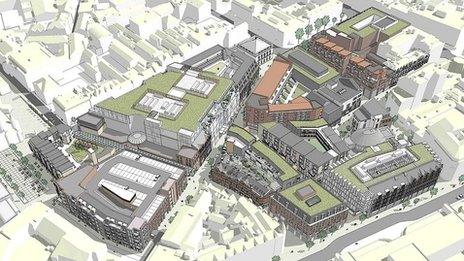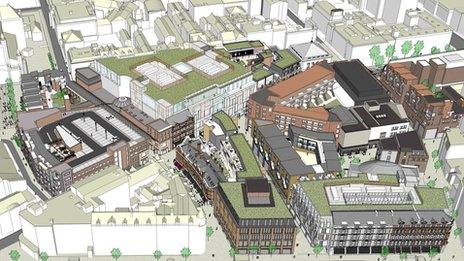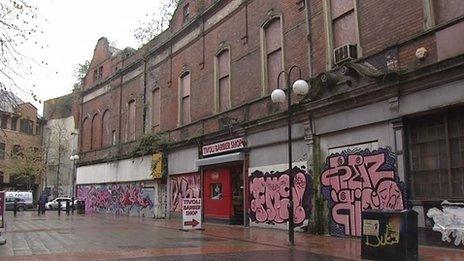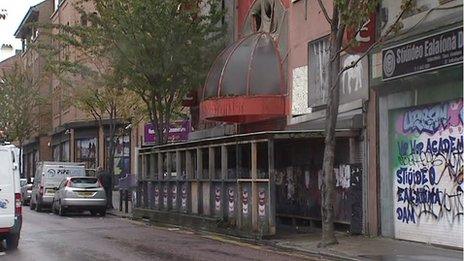Royal Exchange: Alex Attwood approves Belfast city centre plan
- Published

An artist's impression of the Royal Exchange project in Belfast city centre

The planning application, submitted in 2010, was approved on Wednesday

The development aims to regenerate a run down part of Belfast city centre

The former North Street Arcade is to be restored as a focal point of the scheme
.jpg)
The arcade, which runs between North Street and Donegall Street, was extensively damaged by fire in 2004
Plans for a £360m development in Belfast city centre - including new shops, apartments, a hotel, cafes and bars - have been given the green light.
Environment Minister Alex Attwood has approved the Royal Exchange project, which aims to redevelop an area between Royal Avenue and the Cathedral Quarter.
He said it was "tremendous news" for the economy and the environment.
The scheme, first announced in 2006, aims to regenerate run-down and semi-derelict parts of the city centre.
Decline
The 11 acre Royal Exchange development will be constructed in the area bounded by Royal Avenue, Donegall Street, Garfield Street and High Street.
It takes in the North Street Arcade, an architecturally significant shopping arcade which was extensively damaged by a major fire in April 2004.
A planning application for the development was finally submitted in October 2010.
The proposal includes the construction of more than 200 apartments, a 25-bedroom hotel, an arts centre, bars, cafes, offices, and parking space for 1066 vehicles.
It also provides up to 50,000 sq m (539,000 sq ft) of new retail floorspace - almost half of which will be taken up by a single "anchor" department store.
The area was historically the centre of Belfast as the city developed in the late 1800s, but it has been in decline for years.
The Department of Environment (DOE) said the proposed development involves the demolition of a number of existing buildings but other listed buildings and facades would be restored.
It said the work will included the "reinstatement of the North Street Arcade rotunda and its facades".
'Revitalise'
Belfast's oldest public building - the Northern Bank building on Bridge Street - will also be restored and brought back into use under the plans.
In a statement, Mr Attwood said: "The proposal aims to create a new environment in the city and revitalise an area of Belfast that has been without meaningful development for a number of years.
"It is estimated that it will bring 3,000 much needed jobs - 1,000 for the construction phase and 2,000 jobs in retail and leisure once completed," the minister added.
However, given the economic climate and the depressed state of the Northern Ireland property market, it is unclear when building work on the project will get underway.
Andrew Irvine, the head of Belfast City Centre Management, said the development was being viewed as something that would take place "down the line a bit, timewise".
"It's not something that is going to start developing today, so we don't need to look at this in the light of the economy in 2012," he said.
Biggest
Mr Irvine added that he believed that Stormont was "interested in continuing to assess the retail capacity of the city".
The Royal Exchange project is one of the biggest applications to come before planners in Northern Ireland.
It cost in the region of £1m to put together, runs to 11 volumes and it is understood it had to be delivered to planners in a van.
The company behind the proposed development is Leaside Investments, a consortium of two Northern Ireland firms, William Ewart and Snoddons.
The Dutch firm ING had been part of the consortium but withdrew some time ago.
In a statement on Wednesday, Leaside Investments said the minister's decision to approve its plannling application sent "a positive message to large retailers without a presence here that Belfast is open for business".
"We are pleased that the investment we have made, backed up by the hard work and professionalism of our development team over a number of years, is now beginning to take shape in the form of urban regeneration that can have a real, lasting and positive impact on Belfast."
- Published6 March 2012
- Published28 October 2010
- Published25 May 2010